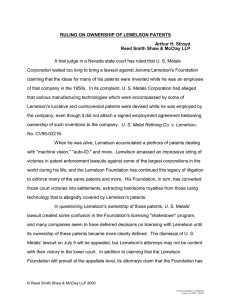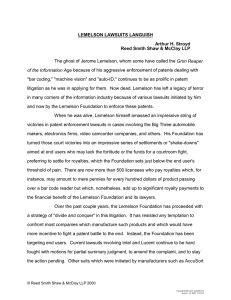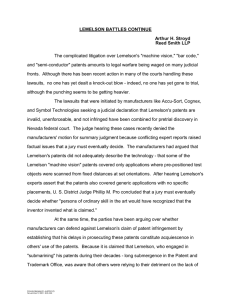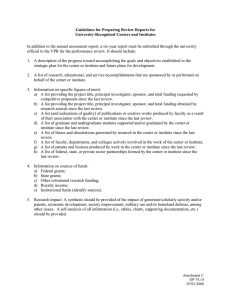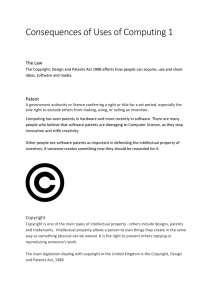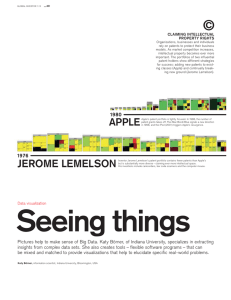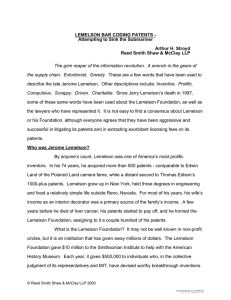Arthur H. Stroyd
advertisement
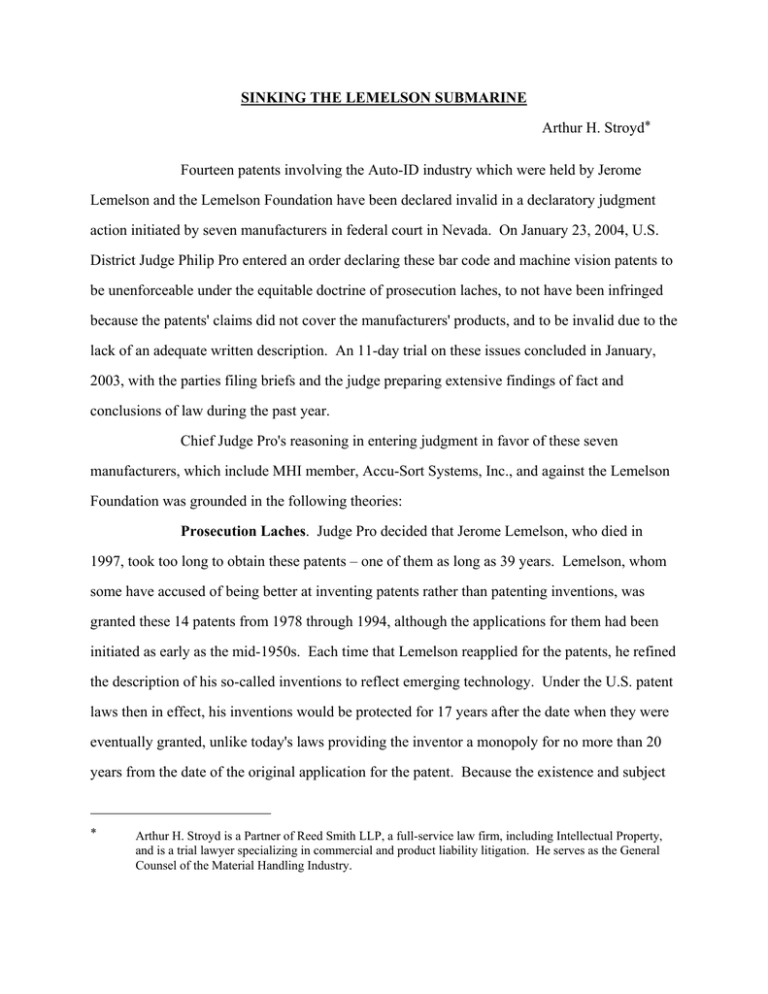
SINKING THE LEMELSON SUBMARINE Arthur H. Stroyd* Fourteen patents involving the Auto-ID industry which were held by Jerome Lemelson and the Lemelson Foundation have been declared invalid in a declaratory judgment action initiated by seven manufacturers in federal court in Nevada. On January 23, 2004, U.S. District Judge Philip Pro entered an order declaring these bar code and machine vision patents to be unenforceable under the equitable doctrine of prosecution laches, to not have been infringed because the patents' claims did not cover the manufacturers' products, and to be invalid due to the lack of an adequate written description. An 11-day trial on these issues concluded in January, 2003, with the parties filing briefs and the judge preparing extensive findings of fact and conclusions of law during the past year. Chief Judge Pro's reasoning in entering judgment in favor of these seven manufacturers, which include MHI member, Accu-Sort Systems, Inc., and against the Lemelson Foundation was grounded in the following theories: Prosecution Laches. Judge Pro decided that Jerome Lemelson, who died in 1997, took too long to obtain these patents – one of them as long as 39 years. Lemelson, whom some have accused of being better at inventing patents rather than patenting inventions, was granted these 14 patents from 1978 through 1994, although the applications for them had been initiated as early as the mid-1950s. Each time that Lemelson reapplied for the patents, he refined the description of his so-called inventions to reflect emerging technology. Under the U.S. patent laws then in effect, his inventions would be protected for 17 years after the date when they were eventually granted, unlike today's laws providing the inventor a monopoly for no more than 20 years from the date of the original application for the patent. Because the existence and subject * Arthur H. Stroyd is a Partner of Reed Smith LLP, a full-service law firm, including Intellectual Property, and is a trial lawyer specializing in commercial and product liability litigation. He serves as the General Counsel of the Material Handling Industry. matter of Lemelson's patent applications were kept secret until the patents were eventually issued, none of the manufacturers was aware of Lemelson's ploy. Lemelson has become notorious for his "submarining" approach of silently pursuing patents by using technology that was emerging. Of the five million U.S. patents which were issued from 1914 through 2001, the 13 patents which took the longest to be processed through the system from the date of the original application to final issuance were all held by Jerome Lemelson. Indeed, one of these Lemelson patents would not otherwise expire until 2011 - 55 years after the original application was filed! District Judge Pro held that Lemelson's delays in securing the asserted claims and his failure to protect his inventions in a timely manner amounted to negligence, at the very least. The manufacturers of bar coding machines, auto-ID, machine vision, scanning devices, and related technologies were diligently developing their technology over the past couple decades and were unaware of Lemelson's applications for patents. Accordingly, Judge Pro concluded that the doctrine of "prosecution laches" rendered these 14 Lemelson patents unenforceable. This defense of "prosecution laches" had been resuscitated in an earlier appeal to the U.S. Court of Appeals for the Federal Circuit, which hears appeals in patent cases from all regions of the country, in this same lawsuit. Breaking from earlier case law involving Lemelson's "submarining" tactics, the Federal Circuit held that this doctrine of prosecution laches bars the enforcement of otherwise valid patents because of unreasonable and unexplained delays in prosecuting them, notwithstanding compliance with pertinent patent statutes and rules, and Judge Pro held these patents were unenforceable as a result. Invalid and Noninfringing Patents. Beyond holding that Lemelson's 14 patents were unenforceable, U. S. District Judge Pro also entered findings of fact and conclusions of law that these Lemelson patents were not valid and that the manufacturers had not infringed on them. He concluded that the manufacturers did not use the technology that was -2- covered by these Lemelson patents, and he further decided that shortcomings with the written descriptions and enablements invalidated the patents, even if they were to be construed in the manner that was urged by the Lemelson Foundation. Indeed, Judge Pro concluded that the manufacturers' products do not work like anything that the Lemelson patents described and do not "embody each and every limitation of any claim by Lemelson." Judge Pro continued, "In sum, Lemelson's patented system could not be used to read a bar code, nor does the Lemelson common specification reveal any teaching or suggestion of catching information or identifying an article by decoding of encoded information." Significant Breakthrough. Judge Pro's decision will not be the final word on these patents' validity or on the question whether these manufacturers infringed them. The Lemelson Foundation will undoubtedly appeal this decision, and the stakes are high enough that, if it is willing to hear a further appeal, the U.S. Supreme Court may be the final arbiter of this matter. If Judge Pro's declaration of the patents' invalidity is ultimately upheld on appeal, the thousand or more licensees of Lemelson patents on bar coding, machine vision, and the like may not be relieved of royalty obligations to the Lemelson Foundation, which are believed to have already siphoned in excess of $1 billion in licensing fees from this industry. Although the Lemelson patents may be a nullity in the end, the existing licensing agreements generally provide that royalties must continue to be paid during the term of the licenses, regardless of any judicial determination of the patents' invalidity. On the other hand, companies which can convince a court that they were fraudulently induced to enter into those licensing agreements may be relieved of future royalty obligations and may even be able to get some of their past royalties back. Also, companies which have not entered into such licensing agreements including those which have been sued by the Lemelson Foundation in recent years for allegedly -3- infringing on these patents would likely be spared further harassment and litigation from the Lemelson Foundation, if the patents' invalidity is upheld on appeal. The entire auto-ID industry as well as the hundreds of end-users which have been sued for infringing will be anxiously following this appeal. *** Arthur H. Stroyd January, 2004 -4-
